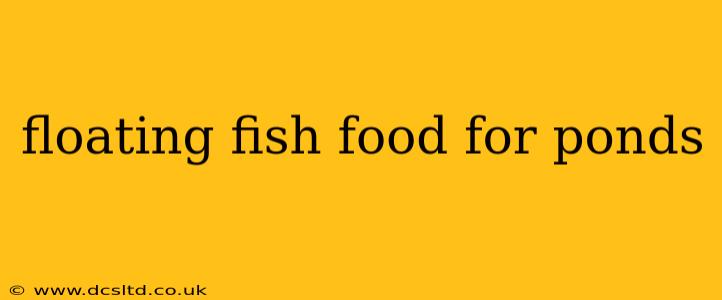Choosing the right fish food is crucial for maintaining the health and vibrancy of your pond's ecosystem. Floating fish food offers several advantages, particularly for ponds with various fish species and depths. This guide will explore the benefits of floating fish food, address common questions, and help you select the best option for your pond.
What are the benefits of using floating fish food for ponds?
Floating fish food offers several key benefits:
- Easy to see and monitor consumption: You can easily observe how much your fish are eating, preventing overfeeding which can lead to water quality issues. This visual feedback allows for better control of feeding routines.
- Suitable for various pond depths: Unlike sinking pellets, floating food is accessible to fish at all depths, ensuring that all your fish, regardless of their location in the pond, can access their meals. This is especially important for ponds with varying depths or structures.
- Reduces water pollution: Proper feeding with floating food minimizes uneaten food sinking to the bottom, reducing the chances of anaerobic decomposition and subsequent water quality problems.
- Attractive to fish: The visible nature of floating food attracts fish, encouraging feeding and making it easier to manage feeding schedules.
- Variety of formulations: Floating food is available in numerous formulations to cater to specific fish needs, including different life stages and species-specific requirements.
What types of floating fish food are available?
The market offers a wide range of floating fish foods, each designed to meet specific needs:
- Flakes: A common and affordable option, flakes are easy to distribute but can sometimes be blown away by wind or quickly dissolve.
- Pellets: These offer a more concentrated source of nutrients and are less prone to wind dispersal than flakes. Floating pellets come in various sizes, catering to different fish species and sizes.
- Mini-pellets: Ideal for smaller fish and fry.
- Larger pellets: Suitable for larger pond fish like Koi.
Choosing the right pellet size is important to ensure all fish can consume the food without difficulty.
How often should I feed my pond fish?
The frequency of feeding depends on several factors, including:
- Water temperature: In warmer months, fish are more active and require more frequent feeding.
- Fish species: Different fish species have varying dietary needs and feeding habits.
- Fish size: Larger fish require larger quantities of food.
Generally, it's recommended to feed your pond fish once or twice a day, providing only what they can consume within a few minutes. Avoid overfeeding, as this can lead to water pollution and algae blooms.
What are the disadvantages of floating fish food?
While floating fish food offers many advantages, it's important to be aware of potential drawbacks:
- Water birds: Floating food can attract birds, which might consume a significant portion of the food intended for your fish.
- Wind dispersal: Flakes can be easily dispersed by wind, leading to wasted food and potential water pollution.
- Potential for overfeeding: Easy observation can sometimes lead to inadvertent overfeeding if not monitored carefully.
What should I look for when buying floating fish food for my pond?
When selecting floating fish food, consider:
- Ingredient quality: Opt for high-quality food with a balanced nutrient profile.
- Specific fish needs: Choose food formulated for the type and size of fish in your pond.
- Reputable brand: Select food from a reputable brand known for producing high-quality, reliable products.
Does floating fish food attract unwanted pests?
Yes, floating fish food can attract unwanted pests such as birds and insects. While this is a minor disadvantage, it’s easily managed through careful feeding and possibly supplemental feeding strategies (e.g., feeding at different times of day to avoid peak bird activity).
Can I use floating fish food for all types of pond fish?
While floating fish food is suitable for a broad range of pond fish, it's important to select food formulated for the specific needs of your fish. Koi, for instance, require a different nutrient profile compared to smaller goldfish. Always check the label to ensure the food is appropriate for your fish species and size.
By carefully considering these factors, you can provide your pond fish with the optimal nutrition they need to thrive, while maintaining a healthy and balanced pond ecosystem. Remember, responsible feeding practices are key to a happy and healthy pond!
